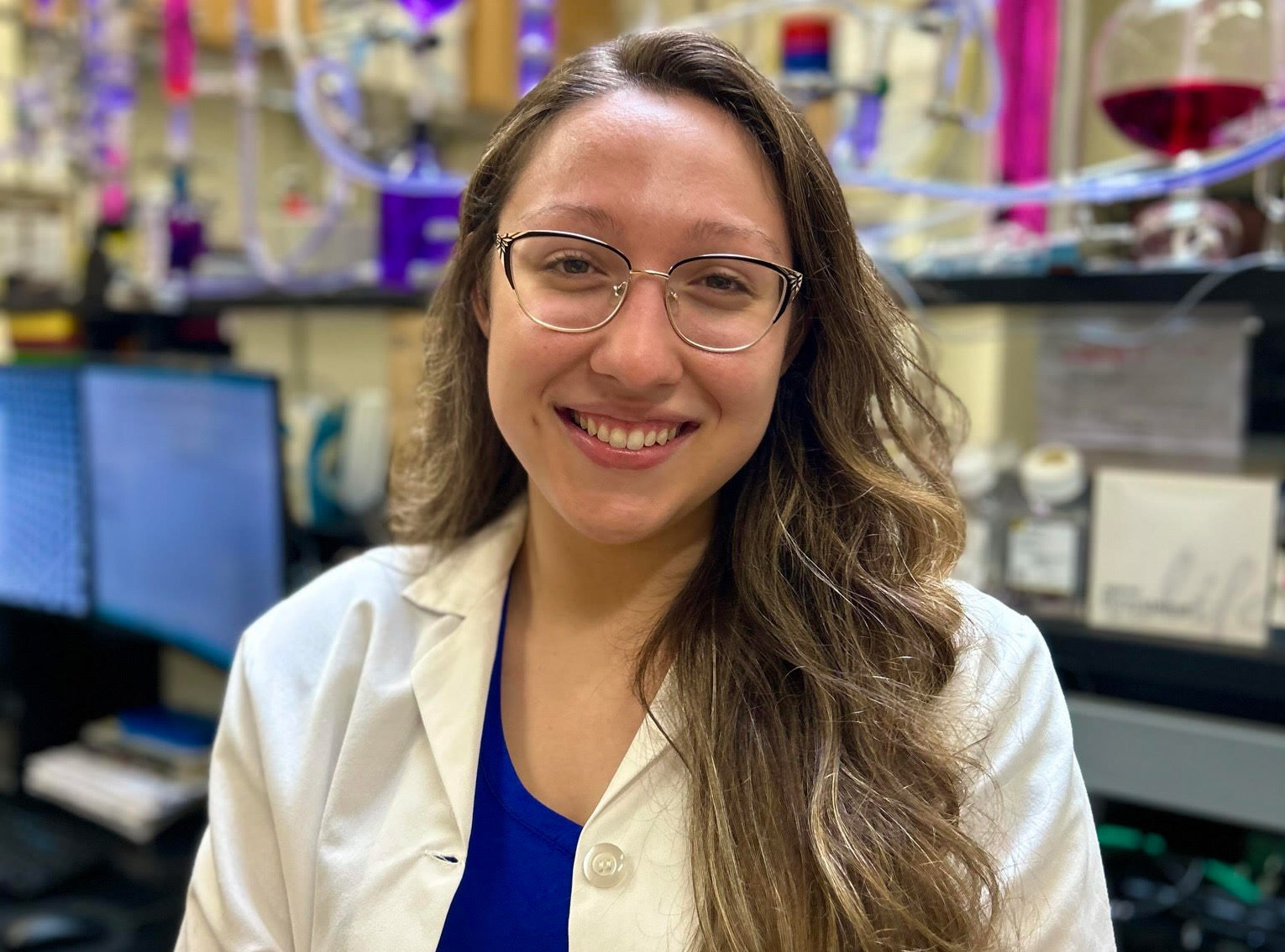
Danielle Diegisser Pushes the Limits in Metabolic Research
Her Work was Recognized with the Dr. Melvin H. Amler Prize for Innovation

Danielle Diegisser, a third-year Ph.D. candidate, embraces the opportunities life has presented to her, leading her to New York Medical College (NYMC) as a pharmacology student from Boston, Massachusetts, as a research assistant at the Joslin Diabetes Center.
From a young age, she was captivated by the sciences and the many unanswered questions they presented. Her curiosity was particularly drawn to metabolic research and obesity, areas that remain poorly understood and present complex challenges.
“Obesity is one of the major issues in, not just America, but across the world,” Diegisser said. “Some people think that the solution is as simple as calories in and calories out. If it was that simple, the problem would be solved, but it’s not.”
Her work, entitled “Pharmacological Blockade of GPR75 for the Prevention and Reversal of Diet-Induced Obesity,” was recently recognized with the Dr. Melvin H. Amler Prize for Innovation at the NYMC 2024 Founder’s Dinner for showing exceptional creativity and ingenuity in the conception of a research idea that merits further development. The award was established by Robert W. Amler, M.D., M.B.A., dean of the School of Health Sciences and Practice and vice president for government affairs, and his family, in honor of his late father, Melvin H. Amler, M.S., D.D.S. Dr. Melvin Amler was a National Institutes of Health (NIH)-funded biomedical researcher and practicing dentist whose creativity inspired his students and colleagues for 65 years. The prize reflects Dr. Amler’s distinct talent for finding innovative solutions to almost any situation, whether at the research bench or his clinical practice.
After earning a Bachelor of Science in Biology from the University of Massachusetts, Lowell, Diegisser worked as a research assistant in the lab of Rohit Kulkarni M.D., Ph.D., under the supervision of Sevim Kahraman-Dirice, M.S., Ph.D., at the Joslin Diabetes Center at Harvard Medical School. She collaborated with some of the leading diabetes researchers in the world and experienced the depth and complexity of diabetic research first-hand, publishing research in major journals, including Nature Metabolism.
When Diegisser heard from Dr. Sevim Kahraman-Dirice that her husband, Ercument Dirice, M.S., Ph.D., assistant professor of pharmacology, was leaving the Center to go to NYMC and needed a lab manager, she was eager to apply. At the Center, she realized she was becoming more hands-on in her work and felt inspired to take on more responsibilities. She accepted the job and booked a one-way ticket to New York.
“Dr. Ercument Dirice helped me a lot through that entire management process since I lacked experience,” said Diegisser. “He was immensely supportive, patient, and kind. I always wanted to find my place in research and advance my career, and this opportunity came from dedicating myself fully to my work at the Center.”
Through her work as a lab manager at NYMC, she became friends with many of her colleagues who were also Ph.D. students or alumni of the College. “They would talk about their classes, namely pharmacology. I always avoided pharmacology because I thought I wouldn’t be good at it, but the more they talked about it, the more I became interested. Pharmacology is fascinating because the focus is on the whole body system. You’re combining all the research from others and turning it into something functional and useful. I wanted to contribute to that.”
In 2022, Diegisser ended her lab manager role and enrolled in NYMC, now, working under the mentorship of Victor G. Garcia, Ph.D. ’15, associate professor of pharmacology, and Michal L. Schwartzman, Ph.D., professor and chair of the Department of Pharmacology, with their support, she is collaborating with researchers who are interested in the ligand-receptor interaction between 20-HETE and its receptor GPR75, and how it contributes to pathways that drive obesity, cardiovascular complications, and metabolic dysfunction. Recently, GPR75 has become a major therapeutic target for obesity and metabolic disease around the world.
Within the topic, her research is focused on therapeutic implications and mechanisms associated with the water-soluble GPR75 blocker, AAA, in the prevention and reversal of diet-induced cardiometabolic complications, including weight gain, diabetes, insulin resistance, and end-organ damage in the form of non-alcoholic or metabolic-associated fatty liver disease (NAFLD/MAFLD) phenotypes.
Diegisser’s work has also earned her the National Institute of Environmental Health Sciences NIEHS/NIH Travel Award and Outstanding Poster Award at the Winter Eicosanoid Conference and second place for the Junior Ph.D. Poster Presentations at the 35th Annual Graduate Student Research Forum at NYMC.
Diegisser is driven by her desire to create meaningful change in pharmacology, using her research to develop potential therapeutic strategies for complex diseases like obesity, diabetes, and metabolic diseases. “There is so much more to uncover in metabolic research,” she said. “I’m thrilled to be a part of this cutting-edge research here at NYMC. The challenges I face push me to grow as a scientist.”

